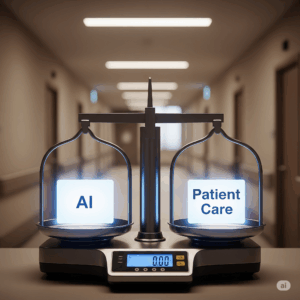In today’s rapidly evolving AI in healthcare landscape, Healthcare Leadership plays a pivotal role in shaping strategy, enhancing patient care, and fostering responsible innovation. The modern health executive must navigate the complexities of AI adoption while ensuring ethical standards, staff readiness, and operational efficiency.
The Rise of Generative AI and Strategic Vision
Generative AI is transforming administrative workflows, diagnostics, and patient engagement. Healthcare leaders must embed AI across functions—no . In 2025, healthcare organizations will likely embrace long-term AI strategies that balance innovation with data privacy and patient safety .
Building AI Governance for Trust and Transparency
Effective Healthcare Leadership requires AI governance structured from day one. Leaders must ensure advanced technologies are transparent, trustworthy, and aligned with clinical decision-making. Frameworks emphasizing ethics, human oversight, and transparency are foundational to responsible AI deployment.
Developing a Culture of AI Readiness
Despite enthusiasm, many healthcare providers still lack the skills to fully harness generative AI—only half align AI strategies with business goals, and over 75% report workforce skills gaps . This highlights the need for strong Healthcare Leadership that invests in training, upskilling, and inclusive professional development .
Leveraging Predictive Analytics and Augmented Intelligence
Healthcare Leadership is increasingly turning to AI tools for high-level decision-making. AI can distill complex data into actionable insights—guiding executive metrics, equitable compensation, and operational goals. Integrating augmented intelligence into core governance enhances efficiency and impact.
The Chief AI Officer in the C-Suite
As AI becomes central to organizational strategy, healthcare institutions are appointing Chief AI Officers (CAIOs). These emerging C-suite roles lead AI integration, governance, and execution—working closely with CEOs, CTOs, and executive leaders to ensure AI is strategically deployed.
AI Agents and Platform Innovation
AI agents (e.g., “Grace,” “Max”) are emerging to support clinical trials, post-discharge follow-ups, and physician briefing—helping reduce burnout and improve operational workflows . Healthcare leadership must evaluate these smart tools critically—balancing innovation with efficacy and regulation.
Collaborating with Big Tech for AI-Driven Transformation
Major tech players—Amazon, Nvidia, Microsoft, Google, Oracle, Salesforce, Palantir—are embedding AI across healthcare platforms, from diagnostics to administrative automation Business Insider. Healthcare Leadership must strategically partner with these innovators to enhance patient care and streamline systems.
Ethical and Inclusive AI Leadership
AI must be deployed equitably, prioritizing patient welfare and reducing bias. Healthcare Leadership must champion ethical AI that fosters access and inclusivity—addressing disparities in diagnostic and predictive models. Transparent, fair AI frameworks are essential.
Continuous Learning and Adaptive Strategies
In this AI-driven era, Healthcare Leadership entails continuous learning—adapting to trends, integrating feedback, and refining governance . Leaders must be agile learners, balancing innovation with compassion and strategic vision.
The Road Ahead
To lead effectively, Healthcare Leadership must combine technological insight, ethical stewardship, and organizational resilience. By fostering AI-ready workforces, establishing robust governance, aligning with industry leaders, and keeping patient well-being front and center, healthcare executives will shape the future of care in an AI-enhanced world.
Dive deeper into AI-driven leadership and healthcare transformation in top business magazine IMPAAKT.














